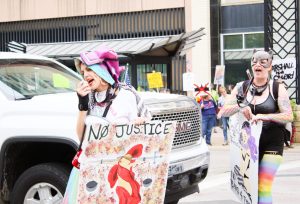Phi’s journey to Derby High one of persistence
April 2, 2020
“Mrs. Phi is really helpful, she helps a lot of kids with their work and she’s so funny,” sophomore Uta Sawamura said.
Uy Phi is not only a teacher at Derby High School — she is also a Vietnamese immigrant, whose journey to America is something few of her students know.
Phi was born in 1953 in Vietnam. She went to high school and graduated college in Vietnam to become a teacher. She had her three children in Vietnam, but then the Vietnam War started.
“So after the communists came, about three months later, I went to the (concentration) camp,” Phi said. “What they called an innovation school, I call it a concentration camp. Because basically I was like a slave. I worked with no pay.
“It’s only the food that they provided. And… that was after my first year of teaching, went there and worked in the field with them. I would chop trees with my axe.
“… I would carry the tree home for them so they could saw it to make a house or log or whatever they do. I got whipped by them one time because I was sick, so I couldn’t take the wood back to the field and they thought I was lazy.”
When she was at the concentration camp she contracted malaria. The camp didn’t have the medication necessary to treat malaria, so she was sent home — only to return after a few days.
“I was in the concentration camp for three years and eight months,” Phi said. “I was in there when I was about 22.”
After she was released from the camp, she went right to work. Phi was determined to get to America; she worked relentlessly to afford a ticket for a boat.
“I went back home to Saigon, then I saved my money and escaped,” Phi said. “I was working to get that money from when I was 25-35 years old. During that time, I worked as an accountant for a company. I was working a lot for around 8-9 years. “
She finally earned the money to get on a boat to America.
“I was in there with a lot of people,” Phi said. “I don’t remember how much it cost. I remember I paid up front. I needed money, real money to get into the boat.”
Once she got into the boat, it was a living nightmare.
“There was a storm, we almost sank. I was on the boat for nine days,” she said.
The boat arrived in Malaysia. Phi stayed at a camp on a tiny island there. At the camp they checked her health and status to see if she was suitable enough to immigrate to America. She stayed in the camp for two months.
Once the officials in Malaysia confirmed her paperwork she was sent to the Philippines, where she stayed for an additional five months.
“From the Philippines, I came here in March 1988,” she said. “I would say it took me about eight months to make the trip from Vietnam to America.”
Once she arrived in the U.S., she immediately started working.
“I went to work for my sister at a restaurant, as a cook and as a dishwasher, everything. My sister retired, so I went to work at another restaurant,” Phi said. “From that restaurant, the owner talked me into going to Cowley Community College. I was able to go to school there for three years.
“I got my Associate’s degree then went to Southwestern College to get my Bachelor’s in accounting… After that I went to Newman for my Master’s in education. I went to school for about 10 years.”
When she first came to America, she faced many difficulties. From juggling two jobs, raising kids, attending university and dealing with discrimination.
“When I first came here I asked myself ‘why did I come here?’ because when I would go to the store people would be looking at me and think ‘Is she trying to steal something? Did she come here to steal from me or what?’” Phi said.
“They kept watching my family. With two kids I had to buy things at a cheap price because I worked as a dishwasher. I had to watch what I had and what I made. I wasn’t happy when I first arrived. I came here not only for my kids but for my education. I was afraid my kids wouldn’t be able to go to school because of the communists.”
She has always been passionate about educating others.
“I’ve always loved education and back then the girls in the family didn’t get to have an education like the boys did,” Phi said. “I didn’t have a chance to go to school.”
Phi loves her students and isn’t afraid to show it. Her room is decorated with pictures of past students.
“I think about how I can help my students understand problems that were hard for me at a young age,” she said. “I enjoy how they share with me what they know.I can learn from them, and they can learn from me.”
Phi has a message that she hopes inspires others going through adversity.
“I just want to encourage people that if you think about what your goal is and go for it and don’t let anything distract you, you can achieve anything you want,” she said. “I have had several times when I wanted to give up in college because I didn’t have much income and some teachers didn’t agree with what I did. That discouraged me. It made me feel like ‘No, I’m done.’
“On the other hand, I also had my advisor at the time telling me that I can do it and to keep going. It is hard to live in America, but the great thing is, it is open for education. You have more opportunities and you can have a job and work. If you want to get a college education you can get it.”





